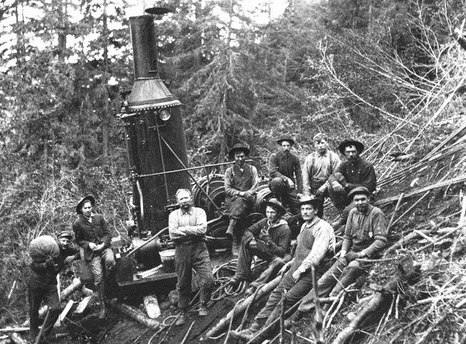A Little History of Logging
- Logging is a fairly dangerous
profession in which woodsman who are called
loggers harvest timber from forests, and then
transport it to a processing plant where it is
manufactured into products for customers. The
New Oxford American Dictionary defines logging
as “Cutting down an area of forest in order to
exploit the timber commercially. Although there
have been many different techniques that loggers
have used to cut down forests, a couple of key
breakthroughs in technology in the last hundred
and fifty years have made logging much more
convenient. Here are a couple of them.
- In the early 1900’s the two-man
buck saw and the ax were used almost exclusively
to cut through wood. Using these two tools, it
would sometimes take loggers multiple days to
cut down a single tree. However, in recent
years, when people started discovering the
usefulness of gasoline powered engine’s the
two-man cross-cut saw was rapidly replaced with
gas powered chainsaws. With this advancement in
technology, loggers could now cut down many
trees in a day.
Photo courtesy of the author
- About one hundred years ago, the
steam donkey was thought to be a state of the
art logging machine. The steam donkey was a
machine used to pull logs out of the woods, and
is defied by the National Park Service as “a
kind of traction engine designed to haul heavy
weights with steel cables pulled by powerful
winches mounted on the front of the machine.”
Although steam donkeys were very powerful, they
had drawbacks, the biggest being that they were
big, bulky, and not very mobile. In response to
these drawbacks, engineers over the last hundred
or so years invented and refined the track-type
tractor, which they called a dozer. With the new
invention of the dozer, loggers were then able
to again increase their daily production.

Logging crew near Haines, Alaska cabling a
donkey engine uphill in 1909. University of
Washington Archives
<http://www.nps.gov/yuch/historyculture/steamdonkey.html>
- Over the last hundred years,
diesel power has been gaining popularity as
inventors, engineers, and designers have refined
the diesel engine into an economic and efficient
means of powering logging equipment. The Diesel
engine can now be found in almost every piece of
logging equipment on the market.
|